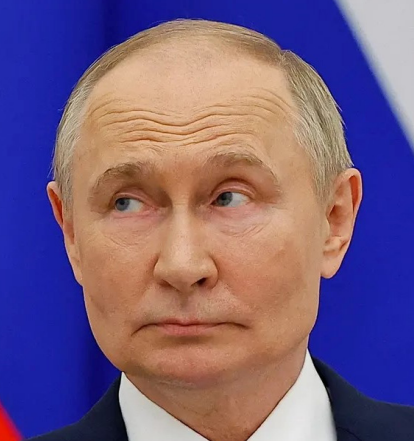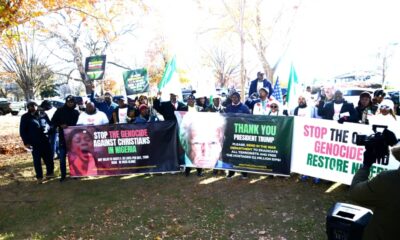Business
U.S. Sanctions Hit Firms Across Asia, Middle East Over Iran Oil Links

U.S. Sanctions Hit Firms Across Asia, Middle East Over Iran Oil Links
In a fresh move to intensify pressure on the Iranian regime, the United States Government has imposed sanctions on several foreign entities allegedly involved in the trade and transportation of Iranian petroleum and petrochemical products, a decision seen as part of Washington’s continued clampdown on Tehran’s funding of destabilising activities across the Middle East.
The sanctions, announced by the U.S. Department of State on Tuesday, target companies operating across multiple jurisdictions, including the United Arab Emirates, China, Türkiye, India, and Indonesia.
The affected entities, according to Washington, engaged in significant transactions involving the purchase, sale, transport, or marketing of Iranian-origin oil and petrochemicals in violation of international sanctions.
The U.S. authorities accused these companies of deploying deceptive practices such as dark shipping and falsified documentation to facilitate the movement of Iranian petroleum products to third-party buyers.
Vessels associated with these transactions reportedly conducted ship-to-ship transfers and engaged in activities that obscured their locations in a bid to evade detection.
The sanctions were implemented pursuant to Executive Order 13846, which provides the legal framework for the U.S. Government to reimpose restrictions on actors supporting Iran’s energy sector.
Washington maintains that revenue derived from these transactions continues to bankroll Iran’s nuclear ambitions, terrorism financing, and internal repression.
The U.S. also sanctioned a China-based crude oil terminal for what it described as a demonstrated pattern of receiving Iranian-origin crude from designated vessels.
It noted that the activities of the sanctioned firms undermine freedom of navigation and contribute to global instability.
The scope of the sanctions extended beyond crude oil to the petrochemical sector, which Washington described as a growing source of illicit revenue for the Iranian government.
Several firms based in India, Türkiye, and the UAE were identified as having imported millions of dollars’ worth of petrochemicals originating from Iran over a period stretching from early 2024 to mid-2025.
These companies, acting either as intermediaries or end buyers, were said to have played key roles in concealing the Iranian origin of the products before they reached their final destinations.
Following the designations, all properties and interests in property of the affected entities within the United States or in possession of U.S. persons have been frozen.
American individuals and businesses are now prohibited from engaging in any transactions with the sanctioned parties unless authorised by the U.S. Treasury’s Office of Foreign Assets Control (OFAC).
The prohibition also covers the provision or receipt of funds, goods, or services to or from any blocked individual or company.
The U.S. Government emphasised that while the sanctions are robust, their ultimate aim is not punitive but corrective.
It stated that individuals or entities affected by the designations could petition for removal from the sanctions list, provided they demonstrate a change in behaviour in line with U.S. laws and foreign policy objectives.
This latest move signals Washington’s resolve to disrupt Iran’s energy-related revenue networks and enforce international norms concerning the non-proliferation of nuclear weapons and support for global security.
Business
Royal Navy Intercepts Russian Warship Amid Surge in Moscow’s Naval Activity

Royal Navy Intercepts Russian Warship Amid Surge in Moscow’s Naval Activity
The United Kingdom says it is witnessing a sharp uptick in Russian military movements at sea, as the Royal Navy confirmed the interception of a Russian corvette and tanker transiting through the English Channel.
The UK Ministry of Defence, in a statement on Saturday, disclosed that Russian naval operations around British waters have risen by 30 per cent in the last two years, a development officials described as “noteworthy and concerning” given the current geopolitical climate.
According to the ministry, HMS Severn, a Royal Navy patrol ship, shadowed the Russian corvette RFN Stoikiy and its support tanker Yelnya as the vessels made their way close to UK waters.
The British crew maintained contact until the ships approached the French coastline, where surveillance duties were formally handed over to a NATO ally in line with long-standing maritime cooperation protocols.
This latest encounter comes against the backdrop of rising tensions between London and Moscow.
Just weeks ago, a Russian intelligence-gathering vessel was accused of pointing lasers at UK surveillance aircraft operating off the coast of Scotland, an action Britain condemned as “reckless and dangerous.”
Moscow, however, dismissed the allegation as “militaristic hysteria,” further deepening diplomatic strains.
Security analysts note that the increase in Russian naval deployments fits into a wider pattern of assertive military posturing by the Kremlin in key maritime corridors.
In response, the UK and its NATO partners have stepped up patrols across the North Atlantic and Arctic regions.
To reinforce ongoing monitoring efforts, the UK has deployed three Poseidon maritime patrol aircraft to Iceland under a NATO arrangement aimed at improving intelligence gathering and boosting situational awareness of Russian submarine and surface vessel activities.
Defence officials stressed that while the interception of foreign warships in international waters is routine, the frequency and nature of recent encounters underscore the need for heightened vigilance.
“The Royal Navy will continue to safeguard our territorial integrity and uphold international maritime security,” a senior defence source said, adding that British forces remain “fully prepared to respond to any emerging threats.”
The UK’s latest move reaffirms its commitment to NATO’s collective defence posture as Russia continues to test Western resolve in contested waters.
Business
US Government Shutdown Grounds Flights as Air Travel Faces “Trickle” Threat

US Government Shutdown Grounds Flights as Air Travel Faces “Trickle” Threat
Air travellers in the United States continue to face severe disruptions for a third consecutive day as the federal government shutdown drags on, with Transportation Secretary Sean Duffy warning that flights could be reduced to a “trickle” if lawmakers fail to resolve the funding impasse.
According to flight tracker FlightAware, approximately 1,400 flights to, from, or within the US were cancelled on Sunday morning, while 2,700 others were delayed.
Newark, New Jersey, reported the longest delays, averaging over two hours.
The shutdown, now in its 40th day, has left hundreds of thousands of federal workers unpaid and disrupted vital services, including air traffic management.
Federal Aviation Administration (FAA) officials had announced last week that air travel capacity would be cut by up to 6% this weekend and 10% next weekend at 40 of the nation’s busiest airports.
While international flights are officially exempt, airlines may still cancel some of these services.
The root of the crisis lies in a political deadlock between Republicans and Democrats over government funding.
Duffy cautioned on CNN that the situation could escalate further, particularly as Americans prepare for the Thanksgiving holiday.
“You’re going to see air travel be reduced to a trickle,” Duffy said.
“Many of them are not going to be able to get on an airplane because there are not going to be that many flights that fly if this thing doesn’t open back up.”
The shutdown has left air traffic controllers fatigued, with many refusing to report to duty due to unpaid wages, forcing the FAA to reduce flight allowances.
While Defence Secretary Pete Hegseth offered military controllers as a stopgap, Duffy rejected the proposal, citing civilian certification requirements.
Political tensions remain high, with each party blaming the other for the growing chaos.
Senate Minority Leader Chuck Schumer accused Republicans of “playing games with people’s livelihoods,” while the White House claimed Democrats are “inflicting their man-made catastrophe on Americans just trying to make life-saving medical trips or get home for Thanksgiving.”
Democrats insist on including funding for health insurance subsidies, a condition that Republicans have resisted, preferring a clean government funding bill.
Meanwhile, President Donald Trump suggested over the weekend that money be sent directly to Americans to purchase health insurance instead of going through insurance companies.
Efforts to reach a compromise appeared to gain some traction, with the Senate convening in a rare weekend session.
Republican lawmakers were reportedly working on a compromise package that could end the stalemate, with a possible vote to advance legislation expected.
Business
U.S. Air Travel in Crisis as 13,000 Air Traffic Controllers Work Without Pay Amid Government Shutdown

U.S. Air Travel in Crisis as 13,000 Air Traffic Controllers Work Without Pay Amid Government Shutdown
The United States is facing a deepening aviation crisis as nearly 13,000 air traffic controllers continue to work without pay for over a month due to the prolonged federal government shutdown, the Federal Aviation Administration (FAA) has said.
The shutdown, now entering its second month, has caused severe disruptions across the country’s air transport system, grounding hundreds of flights and leaving thousands of passengers stranded.
On Sunday morning, the FAA issued a ground stop at Newark Liberty International Airport, one of New York’s busiest air hubs, with average delays stretching beyond three hours.
Officials warned that disruptions could last into Monday as staff shortages cripple flight operations.
At least half of America’s 30 major airports are grappling with critical manpower shortages. The U.S. Transport Secretary, Sean Duffy, confirmed that more flight cancellations are imminent to “ensure public safety.”
“Flights will be cancelled across national airspace to make sure people are safe,” Duffy said during a television interview on Sunday.
Air traffic controllers, like other essential federal workers, have been compelled to remain on duty despite not receiving pay.
They are among thousands affected by the funding deadlock between the Republican-controlled Congress and the Democratic-led Senate.
The FAA, in a statement, appealed to lawmakers to end the shutdown and allow workers to receive their wages, warning that the current situation could trigger further operational breakdowns.
“The shortage means we have had to reduce the flow of air traffic to maintain safety,” the agency stated. “This may result in delays or cancellations.”
According to flight-tracking platform FlightAware, nearly 4,500 flights across the U.S. were delayed and more than 500 cancelled on Saturday alone.
In New York, the nation’s busiest airspace, about 80% of air traffic controllers were absent heading into the weekend, the FAA said.
The resulting gridlock has left airlines scrambling to manage schedules and passengers stranded in terminals.
Secretary Duffy acknowledged the growing strain on aviation workers, noting that many controllers were under “a great deal of stress” as they try to balance their duties and family responsibilities without pay.
“They don’t make a lot of money,” he said.
“Some of them are the only breadwinners in their households. They’re being forced to choose between going to work without a paycheque or finding side jobs just to put food on the table.”
The shutdown stems from a budget impasse in Washington.
A Republican-backed funding bill has failed more than a dozen times to pass the Senate, while Democrats have insisted on conditions to protect social welfare programmes.
They are demanding an extension of health insurance tax credits and a reversal of President Donald Trump’s cuts to Medicaid, which supports millions of low-income, elderly, and disabled Americans.
Meanwhile, Trump has accused Democrats of “holding the government hostage for political gain,” while opposition lawmakers blame the administration’s intransigence for the crisis affecting federal workers and public services.
As the shutdown drags on, pressure is mounting on both sides of the political divide to reach a compromise.
Labour unions and aviation experts have warned that prolonged staff shortages could compromise safety and lead to a cascading effect on the global aviation network.
For now, the FAA insists it will maintain operations under reduced capacity — but warns that the situation is unsustainable.
“The safety of the travelling public remains our top priority,” the agency said. “But our workforce must be supported. America’s airspace cannot run on goodwill forever.”
-

 Diaspora1 week ago
Diaspora1 week agoKillings in Nigeria: ‘Enough is Enough,’ SNG-USA Cries Out from U.S. Capitol
-

 News1 week ago
News1 week agoSecurity Concerns: Ribadu Hosts U.S. Congressional Delegation in Abuja
-

 Analysis1 week ago
Analysis1 week agoBeyond A Defence Minister, by Alabidun Shuaib AbdulRahman
-

 Diaspora1 week ago
Diaspora1 week ago11 Killed, 14 Injured in Mass Shooting at South African Hostel
-

 Analysis1 day ago
Analysis1 day agoInsecurity: Defence, Development, and Duty, by Alabidun Shuaib AbdulRahman
-

 News1 week ago
News1 week agoCARICOM Hails Peaceful, Credible Conduct of Saint Lucia General Elections












